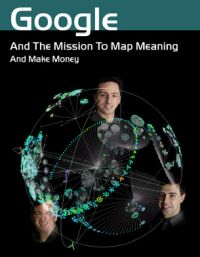Monday, March 7, 2005
Bart Milner’s Mission to Map Google

I’m three-quarter’s through Bart Milner’s book “Google – And the Mission to Map Meaning (And Make Money)”, and some thoughts have been stacking up in my mind.
I find the book to be a great collection of information bits surrounding the Google phenomenon, while at the same time it does not tell a story. It’s actually a collection of blog-style posts which were written online, a brain-dump, which explains the lack of a strong red thread running through the pages. Many chapters contain of nothing but quotes pulled solely from the web (like SearchEngineWatch, the Financial Times) – the author’s main source, as he freely admits. The author then appears to be a mere moderator of news, again something which reminds one of blogs (and even a great blog doesn’t necessarily make a good book).
Incidentally, and this might be because I have seen so many of these Google info-pieces before, I find the book the most interesting the less it touches the subject of Google. It simply doesn’t contain anything new about Google for those who know a lot about Google (except, at least for me, the parts touching the biographies of Larry Page and Sergey Brin). And if you’re just starting out, it also doesn’t quite put it all in the right context or continuity (context, by the way, is one of the main points of the book – into the third quarter, I still don’t know why it is given such emphasis).
But the pieces on Vannevar Bush (author of the prescient 1945 “As We May Think”, in some ways touching on new principles which became the foundation for hypertext) or Ted Nelson (the man behind Xanadu) I find very interesting. While they are too short to be really enlightening, they could serve the function of appetizers to get you started with more. I find it equally interesting, if only for the sake of nostalgia, to read about AltaVista and what it felt like to be using it “back then” (the mid- to late-90s, that is).
In fact, when the book gets too close on the subject of Google, I often find minor factual errors. This starts with spelling (it’s “AdSense”, not “Adsense”, and I prefer “PC” to “pc”), continues with rumors that Google News would feed on RSS (it reads many non-RSS sources, and probably doesn’t rely on RSS at all), or briefly suggests Google ignores stop-words in phrases (only to later clarify it doesn’t). These might be smaller problems on the larger scale, and all in all the author comes off as a highly technically adept person (a programmer, it seems, and someone who had email back in the 80s, which I think does tell something).
All that being said, after initial disappointment I’m now enjoying the book for what I realize it is. It is clearly not the book on Google, which still needs to be written (my bets are placed on John Battelle’s The Search). But if you can take the book for what it is – loosely connected pieces of information – and don’t confuse it with something else – a grand original story to give new meaning – you might enjoy it as well.
>> More posts
Advertisement
This site unofficially covers Google™ and more with some rights reserved. Join our forum!
